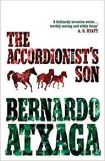The Accordionist's Son by Bernardo Atxaga
| The Accordionist's Son by Bernardo Atxaga | |
|
| |
| Category: Literary Fiction | |
| Reviewer: John Lloyd | |
| Summary: A boy grows up and encounters Basque and Spanish politics. The style is at times a little awkward to get to grips with, and the relevant details of the setting needed more clarification for this to be recommended. | |
| Buy? Maybe | Borrow? Maybe |
| Pages: 384 | Date: October 2008 |
| Publisher: Vintage | |
| ISBN: 978-0099492771 | |
|
| |
David, the principal character in this book, is buried in the first few pages. Luckily for us he has left behind a testimony of his youth and details of how his life then is different to how it has been now. This is not much use to the grieving wife, Mary Ann, as it is written in the Basque language. It is a lot more interesting and accessible to his childhood friend Joseba, who has come to America and David's ranch to meet him for one last time. We have to hope it is as interesting to us.
David did not have a typical, or a particularly enjoyable, youth. Growing up in a rural area of the Basque country, to a musical father and a dress-making mother, he much prefers his rustic friends, however much his father in particular would prefer him to become more sophisticated and aspire to better things. This results in an awkward commute to a bigger-town school, and even a psychiatrist employed to examine him.
David prefers the enjoyment of the countryside where he can go swimming in pools and rivers, enjoy the wildlife and his friends, and make lists of who is his preferred and more important company. Gradually drifting down and off those lists is the man he calls only Angel - who is in fact his father.
Growing up and leaving for college in the mid 60s he very belatedly encounters truths of the Spanish Civil War, and all that came before and after that.
After a diversion to someone else's tale, which has reference to much of the overall story, he is back in his home town of Obaba, a graduate. He is still making lists, and more interested in girls than before, but he and his friends will be further influenced by political events, war, hatred - ETA is in its virile teenage years.
This then, despite the narrator declaring it will be completely alien to his daughters who may one day be part of a limited audience for his autobiography, is actually quite a familiar portrayal of childhood events - the first girl, the big school, the family secret, wrapped up in a unique Basque vision of the permanence of nastiness and bad history.
It is that that works as a unique selling point for the book, but also may hamper its enjoyment. I'm not saying you need to be a professor of recent Spanish unrest to get all the intended effect of the book, but I was slightly left floundering in the politics of the area. The book, which was first written in Basque, then seemingly embellished when translated by the author to Spanish (and now to English by someone else), also makes use of the difference between the dying tongue of Basque and the region's traditions. This can be achieved quite poetically at times, but again elsewhere could have been clearer to the ignorant reader, like me, without becoming a touristy puff piece for the land.
The style of the book does not also go to the utmost to make itself accessible. David obviously has an immense power of recall for all the detail he includes, and while there were stand-out moments (and the donkey's headline act is funny) it sort of drifted past without me being able to engage with it fully - irony, other humour, and a lot of pace changes were all things I missed. The style also has several people's speech quoted in the same paragraph, so careful attention to punctuation and authorial voice is needed at times to be sure who is saying what.
All that and the way the narrative is layered through reportage, short story, a non-linear timeline, and ending in a Rashomon-style repetition of events from different viewpoints, all make me certain this should go down as a literary fiction piece. Again I find myself a student, as I now have to work out how much this is based on truth (the professional writer character Joseba bears our author Bernardo Atxaga's real first name; Obaba is a town he has written about before), and how it would dovetail into his other works.
In the end I was quite intrigued by the unique standpoint of a Basque writer, but try as I might I was not informed as much about life there as I think I could have been. The book did contain interesting enough elements, but was ultimately on the disappointing side when it came to the level to which I could engage with it. I could well have been in the presence of Euskal Herria's most important literary figure (albeit one who now lives in Reno, Nevada) but I was left a bit weary over this work, and could not really recommend it to any but the more knowledgeable and brave reader.
Please share on: ![]() Facebook,
Facebook, ![]() Twitter and
Twitter and
![]() Instagram
Instagram
![]() You can read more book reviews or buy The Accordionist's Son by Bernardo Atxaga at Amazon.co.uk Amazon currently charges £2.99 for standard delivery for orders under £20, over which delivery is free.
You can read more book reviews or buy The Accordionist's Son by Bernardo Atxaga at Amazon.co.uk Amazon currently charges £2.99 for standard delivery for orders under £20, over which delivery is free.
![]() You can read more book reviews or buy The Accordionist's Son by Bernardo Atxaga at Amazon.com.
You can read more book reviews or buy The Accordionist's Son by Bernardo Atxaga at Amazon.com.
Comments
Like to comment on this review?
Just send us an email and we'll put the best up on the site.
Estibalitz Ezkerra said:
Bernardo Atxaga does live in the Basque Country. He was invited to spend a year in Reno (NV) by the Center for Basque Studies at the University of Nevada, Reno.
Best,
Estibalitz Ezkerra Basque Library University of Nevada, Reno
John Lloyd replied:
I am sorry if my information was in error, I was using a Wikipedia page for my research that may well have been out of date. I do not consider it a vital part of my review, or anything that would have changed my opinion, however. John Lloyd.


